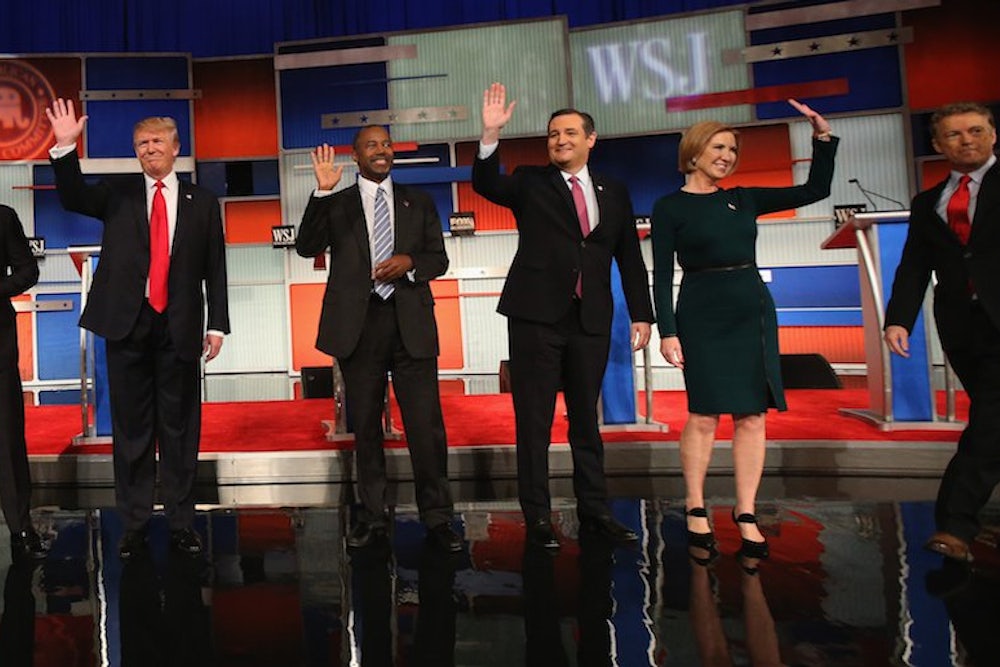The top eight Republican presidential candidates met in Milwaukee, Wisconsin, on November 10 for their fourth debate of the campaign season. The biggest change from the previous debate was the absence of Chris Christie and Mike Huckabee, who were relegated to the undercard debate. You can read the highlights below and follow along on our live blog.
Rubio Wins Big With Welders, Philosophy Haters
Kicking off the fourth debate was a series of questions about the minimum wage, prompting a speech from Marco Rubio about the need to revive and de-stigmatize vocational training. “We need more welders and less philosophers,” he said.
It’s a catchy line, although not everyone agrees:
Hey, Sen Rubio, welders will have more fulfilling lives if they have studied philosophy. It's the zen of arc welding!
—
nickkristof
Welders got a shout-out in the undercard debate as well, from Rick Santorum, who said there are “250,000 welder jobs open in America—250,000 welder jobs paying anywhere from $50,000 to $70,000 a year.” The candidates may be pandering to their Milwaukee-area audience; non-metropolitan Eastern Wisconsin has one of the highest levels of employment for welders. But as Adam Peck noted in our live blog, the idea that welders make more than philosophers is debatable. “The national average salary for welders in 2010 was $37,920. Meanwhile, the median starting salary for philosophy majors was $39,900.”
Carson (Sort of) Addresses Growing Doubts About His Biography
Carson, “a candidate whose brand has always been trust,” according to Fox Business's moderators, addressed pervasive doubts about the veracity of biographical stories that he has told for years, including that he was offered a “scholarship” to West Point.
Carson insisted, “I have no problem with being vetted.” But as Alex Shephard points out on our live blog, Carson actually kind of does: “His strategy for deflecting accusations so far? Talk about Benghazi. He may be dishonest, but Hillary is more dishonest (and she did Benghazi).”
That’s exactly what he did. It was an interesting move after Clinton was widely applauded for her October performance before a House special committee on Benghazi.
Trump: “If you don’t think walls work, ask Israel."
A question from the moderators about immigration gave Trump a chance to address his favorite policy plan: the need for a bigger wall between the U.S. and Mexico.
“If you don’t think walls work, ask Israel,” Trump said. He’s used this exact line before:
""Walls work. All you have to do is ask Israel." Trump is pulling out the classics tonight. #GOPDebate"
—
undefined
The flow of immigrants from Central and South America is not exactly analogous to Israel’s situation. The West Bank Barrier is designed to protect Israelis from Palestinian suicide bombers. Although the Israeli government claims that the wall has drastically reduced violence, it is known by critics as the “apartheid wall.”
History has seen plenty of walls of various effectiveness—Hadrian’s Wall in the U.K., the Great Wall in China, Berlin’s, to name a few. Trump’s own plan, which journalist Jorge Ramos called “a massive human rights violation,” would cost close to $20 billion even before factoring in maintenance and staffing.Let’s Play a Game: Who’s More Conservative?
In an exchange on the budget and the military, Rand Paul called out Marco Rubio’s conservative credentials, citing his support for tax credits and increased defense spending. Rubio struck back, saying, “I know that Rand is a committed isolationist.” Paul retorted, “How is it conservative to add a trillion dollar expenditure for the federal government?”
The crowd cheered as the candidates went back and forth over who was actually the real conservative.
@marcorubio goes after @RandPaul for being an isolationist. And they have a real exchange. Like a real debate. #GOPDebate
—
inthelineofmel
But as Alex Shepard notes in our liveblog, “The crowd at this debate is either divided or confused.” With the speedy exchanges, attendees seemed split about who was in the right:
Rand: How can you be conservative if you want to add $1 trillion in military expenditures?
(crowd goes wild)
Rubio: You can’t have an economy without keeping America safe from ISIS.
(crowd goes wild)
Then Ted Cruz popped in to pile on Paul and the discussion was over. “Try not defending [the United States], that’s a lot more expensive,” Cruz said.
Trump's "Big Chunks" of Oil
In the second half of the debate, questions strayed away from the economic theme and towards Russia and Syria. Trump doesn’t want to commit to sending troops to Syria because we don’t know if the alternative to Assad is worse than Assad, and also because of all the “wounded warriors” to have come out of Iraq. He gave a quick run-down of how he thinks the war in Iraq should have been handled: we should have “kept the oil” and given “big chunks of it to the people who lost their arms, their legs, and their families and their sons and daughters.”
Yet again, this is an opinion that Trump has expressed before. He tweeted about it way back in 2013:
I was never a fan of Bush 2 FOR MANY REASONS, including the fact that we should never have gone into Iraq but once there, kept the oil! DUMB
—
realdonaldtrump
He also mentioned it in an ABC interview earlier this week, suggesting it as a tactic for defeating ISIS. But during the debate the thread of his argument—if there was one—got somewhat lost in his impassioned speech. Can you even have “chunks” of oil?
